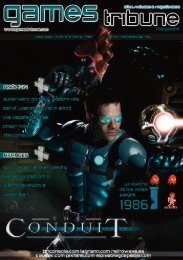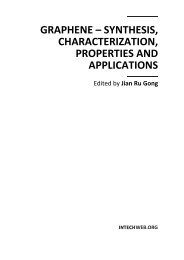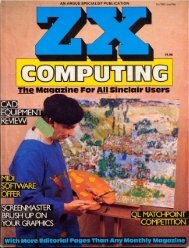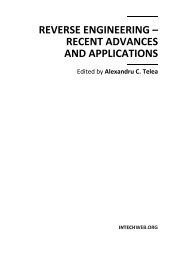PHP Programming Language - OpenLibra
PHP Programming Language - OpenLibra
PHP Programming Language - OpenLibra
Create successful ePaper yourself
Turn your PDF publications into a flip-book with our unique Google optimized e-Paper software.
<strong>PHP</strong> 194<br />
Rasmus Lerdorf, who wrote the original Common Gateway Interface component, Andi Gutmans and Zeev Suraski, who rewrote the parser that<br />
formed <strong>PHP</strong> 3<br />
<strong>PHP</strong> originally stood for personal home page. [2] It began in 1994 as a set of Common Gateway Interface (CGI)<br />
[3] [4]<br />
binaries written in the C programming language by the Danish/Greenlandic programmer Rasmus Lerdorf.<br />
Lerdorf initially created these Personal Home Page Tools to replace a small set of Perl scripts he had been using to<br />
maintain his personal homepage. The tools were used to perform tasks such as displaying his résumé and recording<br />
how much traffic his page was receiving. [2]<br />
He combined these binaries with his Form Interpreter to create <strong>PHP</strong>/FI, which had more functionality. <strong>PHP</strong>/FI<br />
included a larger implementation for the C programming language and could communicate with databases, enabling<br />
the building of simple, dynamic web applications. Lerdorf released <strong>PHP</strong> publicly on June 8, 1995, to accelerate bug<br />
location and improve the code. [5] This release was named <strong>PHP</strong> version 2 and already had the basic functionality that<br />
<strong>PHP</strong> has today. This included Perl-like variables, form handling, and the ability to embed HTML. The syntax was<br />
similar to Perl but was more limited, simpler, and less consistent. [2]<br />
Zeev Suraski and Andi Gutmans, two Israeli developers at the Technion IIT, rewrote the parser in 1997 and formed<br />
the base of <strong>PHP</strong> 3, changing the language's name to the recursive initialism <strong>PHP</strong>: Hypertext Preprocessor. [2] The<br />
development team officially released <strong>PHP</strong>/FI 2 in November 1997 after months of beta testing. Afterwards, public<br />
testing of <strong>PHP</strong> 3 began, and the official launch came in June 1998. Suraski and Gutmans then started a new rewrite<br />
of <strong>PHP</strong>'s core, producing the Zend Engine in 1999. [6] They also founded Zend Technologies in Ramat Gan, Israel. [2]<br />
On May 22, 2000, <strong>PHP</strong> 4, powered by the Zend Engine 1.0, was released. [2] As of August 2008 this branch is up to<br />
[7] [8]<br />
version 4.4.9. <strong>PHP</strong> 4 is no longer under development nor will any security updates be released.<br />
On July 13, 2004, <strong>PHP</strong> 5 was released, powered by the new Zend Engine II. [2] <strong>PHP</strong> 5 included new features such as<br />
improved support for object-oriented programming, the <strong>PHP</strong> Data Objects extension (which defines a lightweight<br />
and consistent interface for accessing databases), and numerous performance enhancements. [9] In 2008 <strong>PHP</strong> 5<br />
became the only stable version under development. Late static binding has been missing from <strong>PHP</strong> and has been<br />
[10] [11]<br />
added in version 5.3.<br />
A new major version has been under development alongside <strong>PHP</strong> 5 for several years. This version was originally<br />
planned to be released as <strong>PHP</strong> 6 as a result of its significant changes, which included plans for full Unicode support.<br />
However, Unicode support took developers much longer to implement than originally thought, and the decision was<br />
made in March 2010 [12] to move the project to a branch, with features still under development moved to a trunk.<br />
Changes in the new code include the removal of register_globals, [13] magic quotes, and safe mode. [7] [14] The reason<br />
for the removals was that register_globals had given way to security holes, and magic quotes had an unpredictable<br />
nature, and was best avoided. Instead, to escape characters, magic quotes may be substituted with the addslashes()<br />
function, or more appropriately an escape mechanism specific to the database vendor itself like<br />
mysql_real_escape_string() for MySQL. Functions that will be removed in future versions and have been deprecated<br />
in <strong>PHP</strong> 5.3 will produce a warning if used. [15]<br />
Many high-profile open-source projects ceased to support <strong>PHP</strong> 4 in new code as of February 5, 2008, because of the<br />
Go<strong>PHP</strong>5 initiative, [16] provided by a consortium of <strong>PHP</strong> developers promoting the transition from <strong>PHP</strong> 4 to <strong>PHP</strong><br />
[17] [18]<br />
5.<br />
<strong>PHP</strong> currently does not have native support for Unicode or multibyte strings; Unicode support is under development<br />
for a future version of <strong>PHP</strong> and will allow strings as well as class, method, and function names to contain non-ASCII<br />
[19] [20]<br />
characters.<br />
<strong>PHP</strong> interpreters are available on both 32-bit and 64-bit operating systems, but on Microsoft Windows the only<br />
official distribution is a 32-bit implementation, requiring Windows 32-bit compatibility mode while using Internet<br />
Information Services (IIS) on a 64-bit Windows platform. As of <strong>PHP</strong> 5.3.0, experimental 64-bit versions are<br />
available for MS Windows. [21]
















